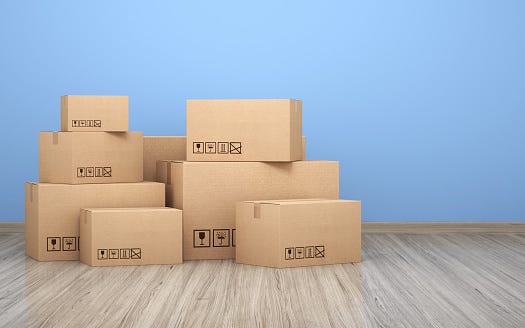40% of homes in the U.S. are selling above asking price, rents are through the roof in coastal cities, and offices are slowly filling up. This all comes to show that this is certainly not a buyers market.
A balanced market is considered to have around six months of supply. Although we’ve been hovering in that range since June 2021, inventory is tight, marginal buyers are priced out, and lack of affordability has been a prominent theme since the pandemic began.
The upside to this madness is that people can finally learn how to build cash flow responsibility by having their home appreciate over time. Real estate is one of my favorite asset classes since it protects the people we love the most, our family. It offers utility and increases that value the more we use it. Unlike public equities, a homeowner has full control over what he/she wants to upgrade and polish for it to sell faster and for more.
Given that location and access to the city, nearby school, and jobs are crucial factors as well as a seller to secure a deal, the effort you put into it by just staying put in it and maximizing it out by building equity in a home will already help you earn a higher return over time. As within the markets, time in the markets beats timing the market. Eventually, the value will go up and overtime, real estate always does, oftentimes uncorrelated to the markets.
It will be hard not to earn a premium on your home these days yet expect to pay just as much or more for a new home, not including the hidden non-recoupable fees such as inspection, agents 3% fee of the transaction cost which are usually paid by the seller for the listing and buying agent, lawyer, taxes, fees, moving costs that all add up and can cost you more than the profit you generated.
In any market, real estate or in the public markets, steer away from equating emotions to decisions. It will serve you better in the long-run since you will be able to make more informed, non-bias heated decisions in the moment. Usually a transaction, especially the biggest ones people make in their lives, a home cannot be reversed so transact carefully.

Stay or Go
One of the best reasons for owning a home is to enjoy and own it. If you have the cash flow to pay off your mortgage in recurring payments or tooj advantage of a low refinancing deal or best, paid it all off, you are in good hands. Now all you have to do is the enjoyable stuff, while of course crossing your fingers that nothing suddenly breaks.
That’s why paying for a home inspection doesn’t hurt so you don’t end up spending the mental and financial hassle of repairing something that you instead just wanted to enjoy when moving in.
Or if you’re looking for the seller to lower the price, you can always ask to waive the home inspection and move in the next day. A faster negotiation is always an opportune move for one side at least, but make sure it’s what you want and helping you at the end of the day.
Living in a home for more than 5 years is the recommended amount of time to build equity and get the most bang for your buck. This also provides more diversification to one’s portfolio with a stable cushion. There’s a reason homeowners are wealthier than renters. They don’t burn cash each month and come out with nothing. Sure, if your net worth is ~20–50x your living expenses, be my guest and rent for the rest of your life but not being able to own something won’t feel right anyway no matter how wealthy you are.
It’s a human desire to want to own something tangible and mess with something you can call yours everyday. Nothing beats the sense of real economic security, something everyone deserves.
These days this ideology has flipped on its head. No pun intended, flipping is a big business now and although there’s low inventory and sky-high prices up ~18% in the last year, Americans are still moving around. They haven’t made up their minds, for the most part.
We are mobile creatures and want to explore new lands. Given all the pent-up demand from the lockdowns, I can sense at least 20% of buyers, and it’s already been reported 80% of pandemic homebuyers regret their home purchases from 2020 since they jumped the gun.
If you made a purchase in the city prior to Dec 2020, you were in luck and actually took advantage of the best dip in the past few decades. The city will never retreat back to these low levels unless King Kong storms the city and the financial district heads home.

Staying Put Becuase They Should
Besides Millennials and rapid decision-making FOMO homeowners, Americans are actually staying put and not moving as much as they used to. This is good and bad, on an individual and cultural level. On one hand, it is healthy to build financail security and own something non-fungible but harmful causing a social crisis already exacerbated by the pandemic in year 3.
The problem with moving is that it is a true hassle. Americans have to deal with 40 year high inflation and residental mobility has gone down and so have levels of happiness, equality, stability, and trust amongst Americans.
Compared to Americans in the 1970s, people who intended to move are 45% less likely to have actually done so today. The pandemic certainly upended our plan to backpack to Germany or Argentina but also our personality traits have changed. Our social bonds are lacking, wea re feeling more lonely, depressed, suicidal, alone, and totally drained by our lack of relationships.

Social Mobility Lacks Mobility
Social mobility correlates to residential mobility fueling economic growth, settlement patterns, religiosity, and relationships driving the correlation. Unemployment and GDP growth in a country dictate it as well, causing cyclical patterns of mobility. I’m particularly surprised to hear that there’s been a steep decline in mobility more than ever before. This is possibly due to the sentiment on the American Dream and how it’s harder than ever to work. The idea that anyone anywhere can achieve anything is a fallacy. Yes it’s possible but on average, it’s not realistic for most, especially when education costs an arm and a leg.
Americans still feel stuck despite the Great Resignation due to prices, uncertainty, and mental illness outbreaks. Wage premiums for college graduates are highly concentrated in cities, hurting the majority of Americans who are spread out the nation. If wages don’t go up, cutting spending is much more difficult.
The supply of housing drives the demand for labor markets the most since construction permits and the stock market are both leading indicators. The price of housing must be correlated to incomes or else there’s no wage-price spiral and salaries must correlate with housing prices in order to survive.
Today, American consumers and savers do report having strong cash cushions but stability doesn’t seem to exist in such a wealthy country like the US that is poorly divided. Americans don’t have as much discretionary income as they used to to pick up and move anywhere, for better or for worse.
Thankfully hybrid is here to stay.
Although interstate mobility is declining, that can at least encourage us to continue aggressively save and invest as most Americans have been doing at an extreme and diligent pace during the scary times of the pandemic. There’s always something to learn and carry on from the tough times. The grass always looks greener on the other side so in that case, appreciate where you are now since prices are rising below you too!

